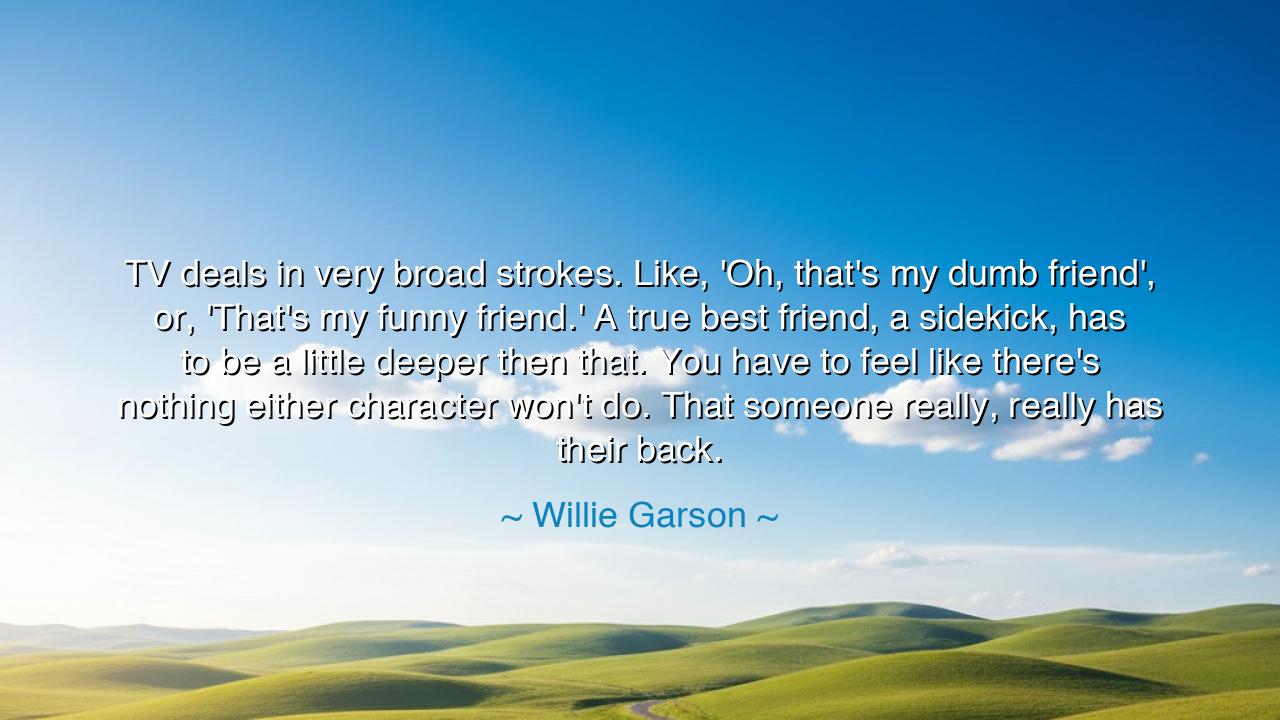
TV deals in very broad strokes. Like, 'Oh, that's my dumb
TV deals in very broad strokes. Like, 'Oh, that's my dumb friend', or, 'That's my funny friend.' A true best friend, a sidekick, has to be a little deeper then that. You have to feel like there's nothing either character won't do. That someone really, really has their back.






“TV deals in very broad strokes. Like, 'Oh, that's my dumb friend', or, 'That's my funny friend.' A true best friend, a sidekick, has to be a little deeper than that. You have to feel like there's nothing either character won't do. That someone really, really has their back.” — thus spoke Willie Garson, a man who, though known for the humor and charm of his performances, understood the sacred depth of friendship far beyond the surface of the screen. Beneath these words lies a truth both artistic and eternal: that the bond between true friends is not built on caricature or convenience, but on loyalty, sacrifice, and trust so profound that it stands firm through every trial.
In these lines, Garson reflects not only on his craft as an actor, but on the essence of human connection itself. He contrasts the simplicity of entertainment’s broad brush — “that’s my funny friend,” “that’s my dumb friend” — with the complexity of a friendship that breathes and endures. In art, as in life, people are too often reduced to roles: the jester, the helper, the listener. Yet a true friend, as Garson teaches, cannot be confined to such labels. A real companion must be deep, must have soul, must be someone for whom no act of courage is too great and no moment of loyalty too small. This, he says, is what makes a friendship — on screen or in life — believable and beautiful.
The origin of this insight comes from Garson’s own life and work, especially his beloved portrayal of Stanford Blatch in Sex and the City — the witty, loyal friend whose compassion made him unforgettable. Garson himself lived the values he spoke of: sincerity, empathy, and unwavering friendship. Offscreen, he was known for mentoring younger actors and standing by those he loved without judgment or pretense. His words, then, are not theory — they are the distilled truth of a life lived among friends, on and beyond the stage. He knew that friendship, like art, must ring true; that one must feel the bond, not merely see it.
His message calls to mind the ancient friendships of history and legend — those that stood not because of sameness, but because of unwavering devotion. Consider the tale of David and Jonathan from the Scriptures: a prince and a shepherd bound not by blood, but by love and loyalty stronger than fear. Jonathan defied his own father, the king, to protect David from harm. Their friendship, woven through danger and exile, stands as a testament to the kind of bond Garson describes — where one soul guards another, even at great cost. Or think of Achilles and Patroclus, whose connection in The Iliad transcended war and death itself; when Patroclus fell, Achilles’ grief shook the heavens. These were not “broad strokes” of companionship, but portraits painted in the deepest colors of loyalty and sacrifice.
Garson reminds us that real friendship — like great storytelling — must reveal vulnerability, not just humor. It must show the moments of doubt, the quiet acts of protection, the unspoken understanding that binds two lives together. To say that someone “has your back” is not to speak of words alone, but of action — of the friend who steps forward when others fall away, who speaks truth when it is hardest, who shields you even when you cannot see the danger yourself. Such friendships are rare, yet when they exist, they become a kind of armor for the soul.
Even in the world of performance, the actors who truly embody friendship on screen draw from this truth. Their connection cannot be faked; it must be felt. When Garson speaks of “a sidekick who has to be a little deeper,” he challenges artists and audiences alike to look beyond the surface — to see in the laughter the weight of shared history, in the banter the quiet comfort of unconditional trust. This is what makes characters timeless and what makes friendships immortal: authenticity. For what is love or loyalty worth if it is not real in the moments when the lights go out?
The lesson, then, is one that stretches beyond art into the beating heart of everyday life: seek depth in those you call friends, and offer it in return. Do not reduce those you love to roles — the funny one, the clever one, the listener — for every soul carries more than a single face. Be the friend who stands firm when laughter fades, who protects without being asked, who remains when others depart. Cultivate bonds not of convenience, but of constancy, for only these will endure the tests of time.
Thus spoke Willie Garson, and his wisdom lives beyond his years: that friendship, whether written in a script or lived in the flesh, is not a performance but a promise. A promise that when the storms come — as they always do — one will not stand alone. For in every age, in every story, it is not the hero who makes the tale immortal, but the one who stands beside him, unseen yet unwavering, whispering the silent vow of every true companion: “I’ve got your back.”






AAdministratorAdministrator
Welcome, honored guests. Please leave a comment, we will respond soon